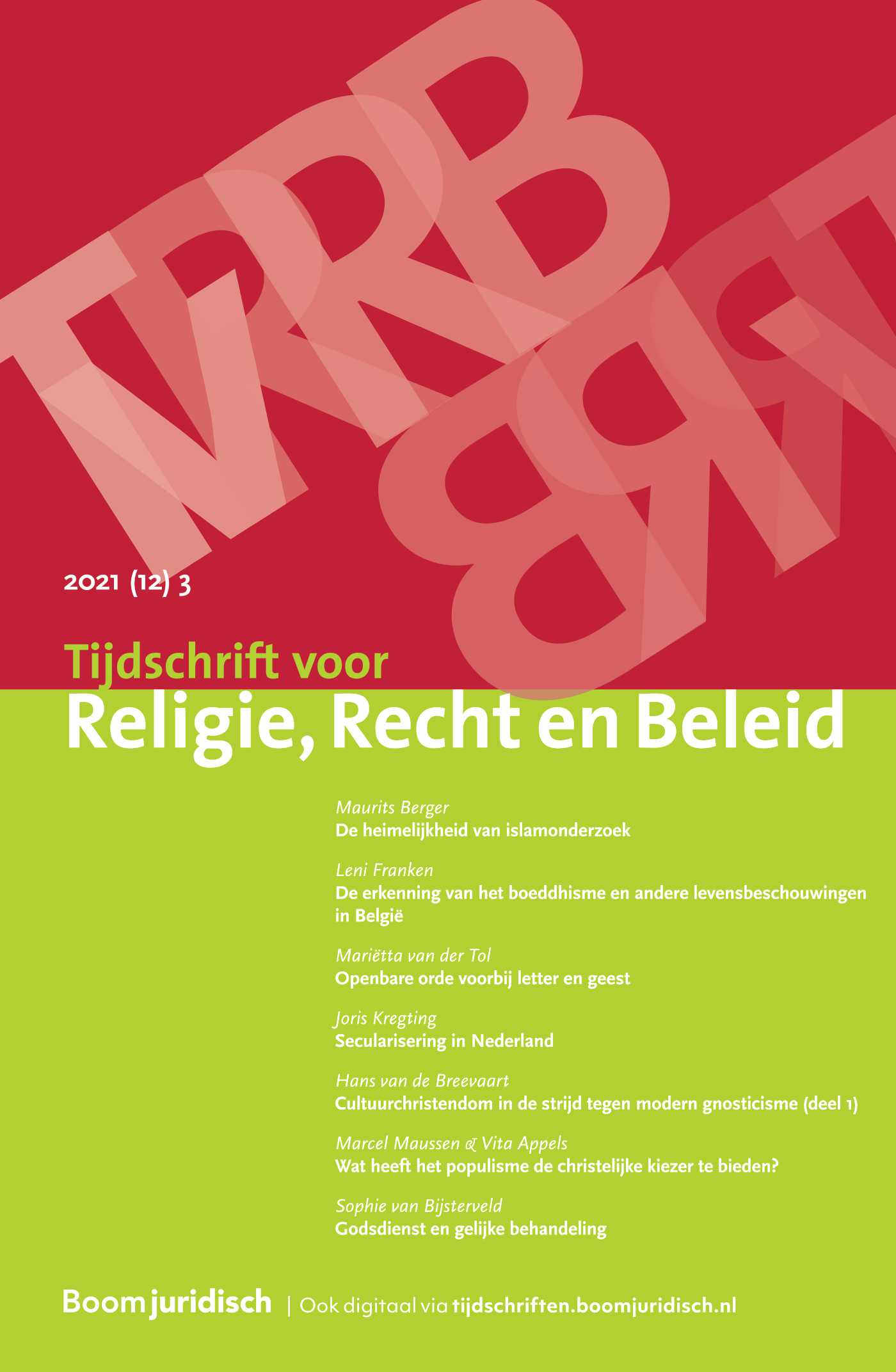|
Disputes about religious freedom are often interpreted as clashes between (perspectives of) liberty and equality, with the latter seen as increasingly gaining the upper hand in contemporary (Western) liberal democracies. This article elaborates these competing liberty- and equality-based perspectives by contrasting their respective views on questions of competence, rights and interests. Furthermore, it provides a detailed reconstruction of the shift towards the egalitarian view in Dutch parliamentary debates about a general anti-discrimination law between 1985 and 2014. |


Tijdschrift voor Religie, Recht en Beleid
Meer op het gebied van Algemeen
Over dit tijdschriftMeld u zich hier aan voor de attendering op dit tijdschrift zodat u direct een mail ontvangt als er een nieuw digitaal nummer is verschenen en u de artikelen online kunt lezen.
| Overwegende ... |
Religie, recht en beleid in internationale conflictenDe kwestie Gaza |
| Trefwoorden | religion, international relations, Israel-Palestine, religious illiteracy |
| Auteurs | Maurits Berger |
| Auteursinformatie |
| Artikel |
Van vrijheid naar gelijkheidVerschuivende visies op godsdienstvrijheid in parlementaire debatten over een Nederlandse algemene antidiscriminatiewet (1985-2014) |
| Trefwoorden | godsdienstvrijheid, gelijkheid, discriminatie, kerk en staat, orthodox protestantisme |
| Auteurs | Lars Nickolson |
| SamenvattingAuteursinformatie |
| Artikel |
Jehovah’s Getuigen: uitsluiting en mijding in het perspectief van de rechtsstaat |
| Trefwoorden | shunning, Jehovah’s Witnesses, collective religious freedom, non-coercive persuasion, right to exclude dissidents |
| Auteurs | Pieter Pel |
| SamenvattingAuteursinformatie |
|
Jehovah’s Witnesses (JW) are sometimes criticised for ‘shunning’ former congregants. This article focuses on the reproach of shunning and has a twofold purpose. Firstly: what is disfellowshipping and shunning about? For an adequate assessment, an analysis of the religious context and the policies JW applied therein is essential. Hereby sociological factors are taken into account as well. Secondly a legal study follows, in which voluntarily or involuntarily leaving the religious community of Jehovah's Witnesses is viewed in the broader constitutional legal framework in which religious communities and individual believers each have their own legal position, both in their mutual relationship to each other and in relation to the society they are in. |
| Artikel |
Religionisten versus politiek realistenHet debat over religie in internationale betrekkingen |
| Trefwoorden | religionisten, politiek realisme, internationale betrekkingen, religie, normatieve praktijkenbenadering |
| Auteurs | Simon Polinder |
| SamenvattingAuteursinformatie |
|
According to religionists, religion plays an important role in international relations. They accuse the field of International Relations and especially the political realism of Morgenthau and Waltz that they neglect religion unjustifiably. This article shows that in many cases it is different and that political realism has reasons of a scientific-philosophical, political-philosophical and political-theological nature to be cautious with regard to religion. To do justice to both the religionists and the political realists, the article proposes a normative practices approach called: a new Christian realism. |
| Artikel |
|
| Trefwoorden | islam in Nederland, toeslagenaffaire, giftenaftrekaffaire, institutionele discriminatie |
| Auteurs | Maurits Berger |
| SamenvattingAuteursinformatie |
|
Discrimination of Muslims in the Netherlands has been consistent since the past decades, but appears to have become more pervasive, especially at a governmental and institutional level. This article discusses the case whereby tax fraud in matters of donations was targeted exclusively at Muslims and Islamic institutions like mosques. It analyses the ways a legitimate inquiry into tax fraud has derailed in an institutional persecution of people based on their religion. |
| Artikel |
Het ene communitarisme is het andere nietEen analyse van de ‘predikantsuitzondering’ en het boerkiniverbod |
| Trefwoorden | liberalisme, communitarisme, religie-staatverhouding, predikantsuitzondering, boerkini |
| Auteurs | Jeroen Jans |
| SamenvattingAuteursinformatie |
|
In this article, I argue that the distinction ‘liberalism versus communitarianism’ offers insufficient conceptual clarity. I do so by comparing the US Supreme Court’s ruling concerning the ministerial exception with the ruling of the Conseil d’État (highest court in France) concerning the wearing of a burkini. I argue that, although both cases seem to be in accordance with a liberal approach to the relation between religion and state, neither of them fully are. Instead, both cases contain main communitarian characteristics. Still, the outcome of both rulings could hardly be more different: a religious exception in case of the ministerial exception and a rejection of such an exception in case of the burkiniban. A further subdivision in these philosophical models is therefore required. |
| Artikel |
Godsdienst en gelijke behandeling in de publieke sectorDe uitspraak van het Hof van Justitie van de EU in de zaak OP/Gemeente Ans |
| Trefwoorden | religie, gelijke behandeling, Richtlijn gelijke behandeling in arbeid en beroep, Hof van Justitie van de Europese Unie, publieke sector |
| Auteurs | Sophie van Bijsterveld |
| SamenvattingAuteursinformatie |
|
In OP v Commune d’Ans (C-148/22), the Court of Justice of the European Union rightly granted the municipal authority a fairly broad margin for establishing policies with respect to prohibiting the showing of signs of inter alia religious faith in the municipal workplace. In doing so, the Court seems to grant the public sector a larger degree of liberty in this respect than it did in its judgments concerning the private sector in interpreting Directive 2000/78/EC – Establishing a general framework for equal treatment in employment and occupation. Such discrepancy is questionable. |

